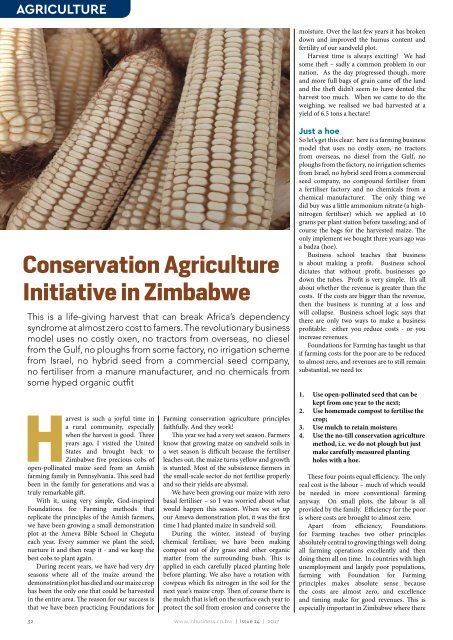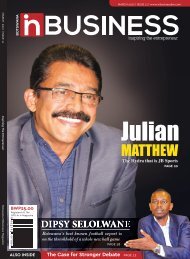inBUSINESS Issue 14
You also want an ePaper? Increase the reach of your titles
YUMPU automatically turns print PDFs into web optimized ePapers that Google loves.
AGRICULTURE<br />
moisture. Over the last few years it has broken<br />
down and improved the humus content and<br />
fertility of our sandveld plot.<br />
Harvest time is always exciting! We had<br />
some theft – sadly a common problem in our<br />
nation. As the day progressed though, more<br />
and more full bags of grain came off the land<br />
and the theft didn’t seem to have dented the<br />
harvest too much. When we came to do the<br />
weighing, we realised we had harvested at a<br />
yield of 6.5 tons a hectare!<br />
Conservation Agriculture<br />
Initiative in Zimbabwe<br />
This is a life-giving harvest that can break Africa’s dependency<br />
syndrome at almost zero cost to famers. The revolutionary business<br />
model uses no costly oxen, no tractors from overseas, no diesel<br />
from the Gulf, no ploughs from some factory, no irrigation scheme<br />
from Israel, no hybrid seed from a commercial seed company,<br />
no fertiliser from a manure manufacturer, and no chemicals from<br />
some hyped organic outfit<br />
Harvest is such a joyful time in<br />
a rural community, especially<br />
when the harvest is good. Three<br />
years ago, I visited the United<br />
States and brought back to<br />
Zimbabwe five precious cobs of<br />
open-pollinated maize seed from an Amish<br />
farming family in Pennsylvania. This seed had<br />
been in the family for generations and was a<br />
truly remarkable gift.<br />
With it, using very simple, God-inspired<br />
Foundations for Farming methods that<br />
replicate the principles of the Amish farmers,<br />
we have been growing a small demonstration<br />
plot at the Ameva Bible School in Chegutu<br />
each year. Every summer we plant the seed,<br />
nurture it and then reap it - and we keep the<br />
best cobs to plant again.<br />
During recent years, we have had very dry<br />
seasons where all of the maize around the<br />
demonstration plot has died and our maize crop<br />
has been the only one that could be harvested<br />
in the entire area. The reason for our success is<br />
that we have been practicing Foundations for<br />
Farming conservation agriculture principles<br />
faithfully. And they work!<br />
This year we had a very wet season. Farmers<br />
know that growing maize on sandveld soils in<br />
a wet season is difficult because the fertiliser<br />
leaches out, the maize turns yellow and growth<br />
is stunted. Most of the subsistence farmers in<br />
the small-scale sector do not fertilise properly<br />
and so their yields are abysmal.<br />
We have been growing our maize with zero<br />
basal fertiliser – so I was worried about what<br />
would happen this season. When we set up<br />
our Ameva demonstration plot, it was the first<br />
time I had planted maize in sandveld soil.<br />
During the winter, instead of buying<br />
chemical fertiliser, we have been making<br />
compost out of dry grass and other organic<br />
matter from the surrounding bush. This is<br />
applied in each carefully placed planting hole<br />
before planting. We also have a rotation with<br />
cowpeas which fix nitrogen in the soil for the<br />
next year’s maize crop. Then of course there is<br />
the mulch that is left on the surface each year to<br />
protect the soil from erosion and conserve the<br />
Just a hoe<br />
So let’s get this clear: here is a farming business<br />
model that uses no costly oxen, no tractors<br />
from overseas, no diesel from the Gulf, no<br />
ploughs from the factory, no irrigation schemes<br />
from Israel, no hybrid seed from a commercial<br />
seed company, no compound fertiliser from<br />
a fertiliser factory and no chemicals from a<br />
chemical manufacturer. The only thing we<br />
did buy was a little ammonium nitrate (a highnitrogen<br />
fertiliser) which we applied at 10<br />
grams per plant station before tasseling; and of<br />
course the bags for the harvested maize. The<br />
only implement we bought three years ago was<br />
a badza (hoe).<br />
Business school teaches that business<br />
is about making a profit. Business school<br />
dictates that without profit, businesses go<br />
down the tubes. Profit is very simple. It’s all<br />
about whether the revenue is greater than the<br />
costs. If the costs are bigger than the revenue,<br />
then the business is running at a loss and<br />
will collapse. Business school logic says that<br />
there are only two ways to make a business<br />
profitable: either you reduce costs - or you<br />
increase revenues.<br />
Foundations for Farming has taught us that<br />
if farming costs for the poor are to be reduced<br />
to almost zero, and revenues are to still remain<br />
substantial, we need to:<br />
1. Use open-pollinated seed that can be<br />
kept from one year to the next;<br />
2. Use homemade compost to fertilise the<br />
crop;<br />
3. Use mulch to retain moisture;<br />
4. Use the no-till conservation agriculture<br />
method, i.e. we do not plough but just<br />
make carefully measured planting<br />
holes with a hoe.<br />
These four points equal efficiency. The only<br />
real cost is the labour – much of which would<br />
be needed in more conventional farming<br />
anyway. On small plots, the labour is all<br />
provided by the family. Efficiency for the poor<br />
is where costs are brought to almost zero.<br />
Apart from efficiency, Foundations<br />
for Farming teaches two other principles<br />
absolutely central to growing things well: doing<br />
all farming operations excellently and then<br />
doing them all on time. In countries with high<br />
unemployment and largely poor populations,<br />
farming with Foundation for Farming<br />
principles makes absolute sense because<br />
the costs are almost zero, and excellence<br />
and timing make for good revenues. This is<br />
especially important in Zimbabwe where there<br />
32<br />
www.inbusiness.co.bw | <strong>Issue</strong> <strong>14</strong> | 2017
















